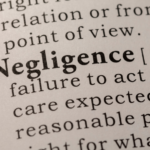Insights
Stay in the loop with the newest knowledge, updates, and tips concerning our areas of practise.
Understanding the Limitation Period for Unpaid Debt Claims
When pursuing unpaid debts, it is crucial to be aware of the legal time limits within which claims...
Correspondence giving rise to waiver of contractual terms: Little & Another v Olympian Homes Ltd [2024] EWHC 1766 (Ch)
This case concerns two applications to set aside statutory demands related to personal guarantees on a facility agreement....
Facing a Possession Claim for Mortgage Arrears
Financial difficulties can be overwhelming, and if you have fallen behind on your mortgage payments, your lender may...
The End of Section 21 Notices: What the Renter’s Rights Bill Means for Landlords
The UK rental market is set to undergo a significant transformation in 2025 with the introduction of the...
The rise of APP Fraud and Scams
Authorised Push Payment (APP) fraud, also known as "push payment fraud," is a type of scam where the...
Cryptocurrency Fraud & Scams: Protecting Your Investments and Recovering Your Assets
The rise of cryptocurrencies has introduced a new era of digital finance, offering exciting opportunities for investment and...
Personal Guarantees: Risks and Considerations
When entering into business agreements, many individuals are asked to sign personal guarantees as a way to secure...
DKH Retail Ltd v City Football Group Ltd: Order to attempt mediation
The duty of parties in litigation to attempt alternative dispute resolution Alternative dispute resolution (ADR) methods have gained...
Debt Recovery in the UK
Expert legal advice for seamless debt recovery In today’s fast-paced world, financial stability is paramount. Unfortunately, there...
Professional Negligence: What you need to know
In the realm of professional services, such as law, finance, and medicine, there's an expectation that the individuals...
Removing a Director from your Company
It is usual that company directors are also shareholders and/or employees of the company. Therefore, if you are...
Understanding the Significance of Statutory Demands
What is a statutory Demand A statutory demand is defined by parts 7.2 and 7.3 of the...
COVID-19 Support: Business Interruption Insurance
As non-essential businesses have been forced to cease trading indefinitely, this casts a dark shadow of uncertainty over...
Freeholder Estopped from Claiming Possession
Ms Sahota, the claimant was estopped by Mrs Justice Falk from possession of the property during the lifetime...
Evidence – Relief from Sanctions (High Court)
The defendant, Sheffield United Limited raised an issue about two share sale agreements made between the claimant and...
Loss of Chance When a Third Party Gives Evidence at Trial (High Court)
This case relates to a joint venture property transaction between two property development companies. Background The claimant instructed...
Can a Dissolved Company Apply for a Freezing Order
In the High Court (Zacaroli J) considered whether a dissolved company, that did not exist, could be granted...
Claim In Relation To Horse Race Data Dismissed (High Court)
The High Court has held that various actions in relation to horse racing, and to the collection and...
The Disclosure Pilot Scheme (High Court)
Disclosure in commercial litigation is an expensive process. To reduce the increasing cost of litigation and to achieve...
The County Courts (Interest on Judgment Debts) (Amendment) Order 2019
The County Courts (Interest on Judgment Debts) (Amendment) Order 2019 was made on 24 April 2019 and shall...
Privacy Right Breached
The Hight Court has held that an individual’s right to privacy has been breached by the publication of...
Litigation Tips
I have been a qualified solicitor for five years, prior to that I had 18 months as a...
Sale of A Website
Muldoon Britton was instructed by a US based client who had won a website on an internet based...
GRG: What You Need to Know
We have written a lot about GRG previously. However, we have seen a pattern in people contacting us...
PPI and The Latest FCA Compensation Scheme
It was hoped that the banking industries’ long running PPI headache would come to an end in August...
PPI, Plevin & The Case of the FCA’s Decisions
The FCA has placed a final date for when PPI claimants can recover their PPI premia (August 2019)....
Copyright: Youtube, Newspapers & Blogs
The Press Gazette has printed an article claiming that Rochdale Online, a news site, had sued the Manchester...
Is There A Banking Crisis Looming? What Do You Need To Know?
On 7 October 2008 a telephone call took place that will most certainly feature in economics and politics...
Royal Bank of Scotland Plc (“RBS”) Global Restructuring Group (“GRG”) Complaints’ Process
Most, if not all, of SMEs have now received either their final offer or the cash for the...
Get in Touch
With years of litigation experience, our advisers can help you navigate every process, ensuring that you take best steps towards achieving your goals.























